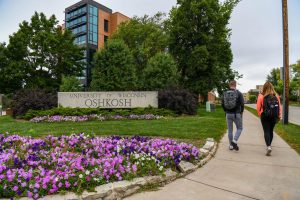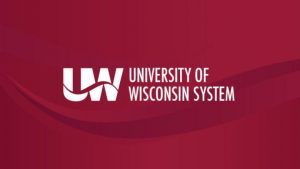UW System sees uncertain future as it navigates the ‘New Normal’
Evers: Testing needs to increase to reopen campuses
April 23, 2020

Coronavirus testing across Wisconsin needs to significantly increase in order to safely reopen higher education institutions, which will be essential in navigating the “new normal” caused by the pandemic, said Gov. Tony Evers at the “Future of the UW System” virtual town hall Tuesday.
Despite the need for education to guide decision making as the world continues to navigate the pandemic, many UW System institutions are feeling a financial strain and are being forced to make hard budgetary decisions.
To save roughly $3 million, roughly 600 UW System employees have been ordered to take unpaid time off for one day each month through June 2021. UW Oshkosh has already announced a plan to furlough some 12-month employees from May 4 through Aug. 31, and to furlough the remaining employees intermittently from May 4, 2020 through June 2021.
In terms of future plans to furlough system workers, UW-Green Bay history professor Jon Shelton, who co-hosted the town hall held by the American Federation of Teachers-Wisconsin, said there will likely be more to come as many institutions were already facing drastic budget cuts before the COVID-19 crisis began.
“This crisis has made the situation much worse,” Shelton said. “These [furloughs] are absolutely tragic and they’re likely to hit the most vulnerable employees in the UW System the hardest.”
Even after the state reopens, Shelton says UW institutions could see fluctuating enrollments until a vaccine is widely available.
To address the issue, U.S. Rep. Mark Pocan, D-Madison, said future coronavirus relief legislation needs to increase funding to state and local governments in order to make sure higher education is made “as whole as possible.”
Pocan said testing needs to ramp up before universities can safely reopen. Currently, he says the state is testing about 7,000 people a day for COVID-19, and has the capacity to run 17,000 tests a day, but lacks critical supplies.
“We are woefully lacking the supplies we need in Wisconsin to get back to normal,” Pocan said.
He says the Safer at Home order is pivotal in giving the state time to ramp up testing and find best practices for reopening higher education institutions.
“You gotta crawl before you walk, and crawling right now is getting the very supplies we need so we can be in a position to be having those conversations,” Pocan said. “And right now the Trump administration is not living up to their promise.”
Pocan said the state is only getting “partial shipments” of supplies from the federal government, and is being forced to buy testing supplies from private companies.
“We need the president to step up on the Defense Production Act and get more supplies — made here in the U.S. — to states like Wisconsin; so that when we have a talk about education, we’re talking about the very near future of opening things back up,” Pocan said.
Evers echoed the need to ramp up testing, saying it will be needed to move from “boxing in people to boxing in the virus.”
To do that, Evers said the criteria for receiving a test needs to be lowered, and the state needs to start running 85,000 tests per week.
As well as testing, Evers says the state needs to conduct thorough contact tracing to find those who have been in close contact with someone who has the virus.
“That is the only way that we’re going to really not only bend the curve, but actually start to reduce the number of people showing positive on a test,” Evers said.
Even as testing and contact tracing increase, Evers said the world will look “very different” until a vaccine is found. And as the world navigates the “new normal,” he says education will be critical.
Evers said he will continue to make education a priority and find a way to keep it funded, by looking for revenue streams that could increase state funding, beyond federal assistance.
State Rep. Katrina Shankland, D-Stevens Point, said her office is having conversations with the UW System about how the state legislature can help.
At the state level, Shankland said the only COVID-19 relief bill that’s been passed did not include UW System funding. She said her Democratic colleagues proposed an amendment to the bill that would have included UW System funding, but it failed on a party line vote.
In terms of preparing the biennial budget for state money, she said lawmakers don’t know what next year’s revenue projections will look like. She says the budget needs to look at how to use federal funds efficiently, and how to appropriate Wisconsin’s General Purpose Revenue in a smart way.
Shankland said funding for higher education cannot fall as much as it did during the Great Recession and that lawmakers need to provide adequate resources to keep higher education affordable.
“Now is not the time to balance budgets on the back of students who are struggling to make ends meet,” Shankland said. “Let’s also make sure our lawmakers recognize the importance of higher education, especially when there’s a high unemployment rate, [because] that’s when folks tend to go back to and use higher education for their personal development.”
At the system level, Regent Karen Walsh said moving an entire semester online in a quick matter of time to prevent the spread of COVID-19 was a tremendous accomplishment for faculty and staff.
“I think everyone understands that the ground underneath us has shifted and the odds that it’s going to shift back exactly the same way are virtually zero,” Walsh said. “So the question is how do we move forward?”
Walsh said the pandemic gives the UW System an opportunity to rebuild and become Wisconsin’s engine for economic recovery for the next 10 to 20 years.
She says businesses will rely on the system as workers who have been displaced need to retool their skills through higher education.
To continue to provide quality higher education through the uncertainty of the pandemic, Walsh said the system will need everyone’s best creative efforts.
“We know we have to make changes, we know we can’t protect everybody from that change,” Walsh said. “I hope that chancellors, as they make decisions on their own campuses, understand that faculty input to these decisions is incredibly important.”













